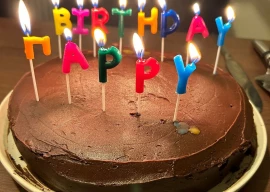
Dua Lipa, the acclaimed singer with numerous hits under her belt, graced the February cover of Rolling Stone, wherein she spoke in great detail about numerous aspects of stardom. Given that the singer, who was born to Albanian parents in London, has been vocal about the Israeli apartheid in Palestine, the star also spoke up about her political existence, whilst advocating for a “humanitarian cease-fire.”
“My existence is kind of political, the fact that I lived in London because my parents left from the war,” Dua said. “I feel for people who have to leave their home. From my experience of being in Kosovo and understanding what war does, no one really wants to leave their home. They do it for protection, to save their family, to look after the people around them, that kind of thing, for a better life. So I feel close to it.”
The singing sensation added, “My feelings on displaced people [are] very real and raw, and it is a difficult subject to speak about because it’s so divisive,” She furthered on, “I feel so bad for every Israeli life lost and what happened on October 7."
Dua joined a group of celebrities in signing an open letter urging President Biden to intervene for an immediate de-escalation and ceasefire in Israel's war on Palestine to prevent further loss of life. The letter also advocated for the release of hostages. Notable personalities like Ayo Edebiri, Michael Stipe, Jon Stewart, Jessica Chastain, Cate Blanchett, and Joaquin Phoenix were among the signatories. The collective effort aimed to draw attention to the ongoing crisis and promote diplomatic solutions.
She continued, “At the moment, what we have to look at is how many lives have been lost in Gaza, and the innocent civilians, and the lives that are just being lost. There are just not enough world leaders that are taking a stand and speaking up about the humanitarian crisis that’s happening, the humanitarian cease-fire that has to happen."
In 2021, a full-page ad in The New York Times, orchestrated by Rabbi Shmuley Boteach and the World Values Network, accused Dua and other celebrities of antisemitism, citing their support for Palestinian liberation. The singer vehemently rejected these allegations on her social media channels and criticised the newspaper for running the ad. She went a step further by inviting the then-Times editor, Dean Baquet, to discuss the ad's perceived harmful and risky nature on her podcast. Dua conveyed a sense of vulnerability, feeling "put in danger" due to the unfolding situation.
“I was put in a place where my core values were completely flipped on its head, and that really hurt because I feel like when I do want to speak about something, I hope that people will see it for what it is and that there is no malicious intent,” she told Rolling Stone.
Have something to add? Share it in the comments




1731588327-0/BeFunky-collage-(59)1731588327-0-165x106.webp)

1730874433-0/Copy-of-Untitled-(64)1730874433-0-270x192.webp)


1729930993-0/WhatsApp-Image-2024-10-26-at-08-52-06-(2)1729930993-0-270x192.webp)
1729844217-0/WhatsApp-Image-2024-10-17-at-11-58-38-(1)1729844217-0-270x192.webp)






COMMENTS
Comments are moderated and generally will be posted if they are on-topic and not abusive.
For more information, please see our Comments FAQ